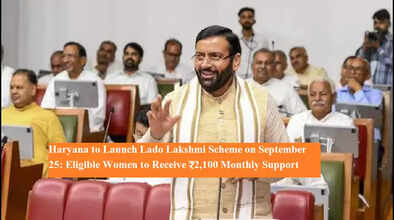Haryana to Launch Lado Lakshmi Scheme on September 25: Eligible Women to Receive ₹2,100 Monthly Support

Haryana Chief Minister Nayab Singh Saini has finally announced the much-awaited launch date of the Deendayal Lado Lakshmi Yojana, a welfare scheme aimed at empowering women across the state. Starting September 25, 2025, on the birth anniversary of Pandit Deendayal Upadhyaya, eligible women will begin receiving ₹2,100 every month directly into their bank accounts.
First Phase Rollout: Women from Low-Income Families to Benefit
While making the official announcement, CM Saini clarified that in the initial phase, the scheme will cover women from families with an annual household income of less than ₹1 lakh. Gradually, women from other income groups will also be included.
The Chief Minister highlighted that the scheme has been approved in the cabinet meeting and will provide financial relief to lakhs of women across the state. He emphasized that whether married or unmarried, all women above 23 years of age will be eligible to apply, provided they meet the residency criteria.
Eligibility Criteria Explained
To avail of the scheme, women must fulfill certain eligibility requirements:
-
Residency: The applicant should have been a resident of Haryana for at least 15 years. In case of married women, their husbands must also meet the same residency condition.
-
Age: Only women aged 23 years and above can apply.
-
No Cap on Beneficiaries per Family: Unlike many other schemes, multiple women from the same household can benefit, as long as each of them individually qualifies.
This inclusive approach ensures that every eligible woman within a family can receive financial support, without any restriction on the number of beneficiaries.
Exclusions: Who Will Not Get the ₹2,100 Monthly Aid?
The government has also drawn clear lines regarding exclusions. Women who are already benefiting from nine other existing state welfare schemes that provide more than ₹2,100 per month will not be covered under this program.
However, in a humanitarian move, the cabinet decided that women suffering from Stage-3 cancer, thalassemia, or any of 54 identified rare diseases will continue to receive ₹2,100 separately under this scheme, even if they fall under the exclusion list.
Scale and Budget of the Lado Lakshmi Yojana
The Lado Lakshmi Yojana was one of the key promises made by the Bharatiya Janata Party (BJP) in the run-up to the Haryana Assembly elections. According to government estimates, nearly 50 lakh women across the state are expected to benefit from the scheme.
To ensure smooth implementation, the Haryana government has allocated a dedicated budget of ₹5,000 crore for this program in the 2025 state budget.
Benefits of the Scheme
The scheme is expected to bring multiple benefits, including:
-
Direct financial support to women every month.
-
Strengthening of women’s economic independence and decision-making power.
-
Assistance to families struggling with low household incomes.
The government believes this monthly transfer will provide much-needed relief to women and contribute to improving their overall quality of life.
Required Documents for Application
Women who wish to apply will need to provide the following documents:
-
Family Identity Card (Parivar Pehchan Patra)
-
Aadhaar card issued in Haryana
-
Proof of at least 15 years of permanent residency in Haryana
-
Income certificate (mandatory in the first phase for families earning less than ₹1 lakh annually)
-
Age certificate
A Step Toward Women’s Empowerment
With this scheme, the Haryana government aims to reduce economic disparities and ensure that women—especially those from underprivileged sections—gain financial stability. The direct benefit transfer (DBT) system will ensure transparency and prevent any misuse of funds.
As the launch date approaches, anticipation is high among women across Haryana. If implemented effectively, the Deendayal Lado Lakshmi Yojana could emerge as a transformative initiative, empowering millions of women with steady financial support and paving the way for greater gender equality in the state.

